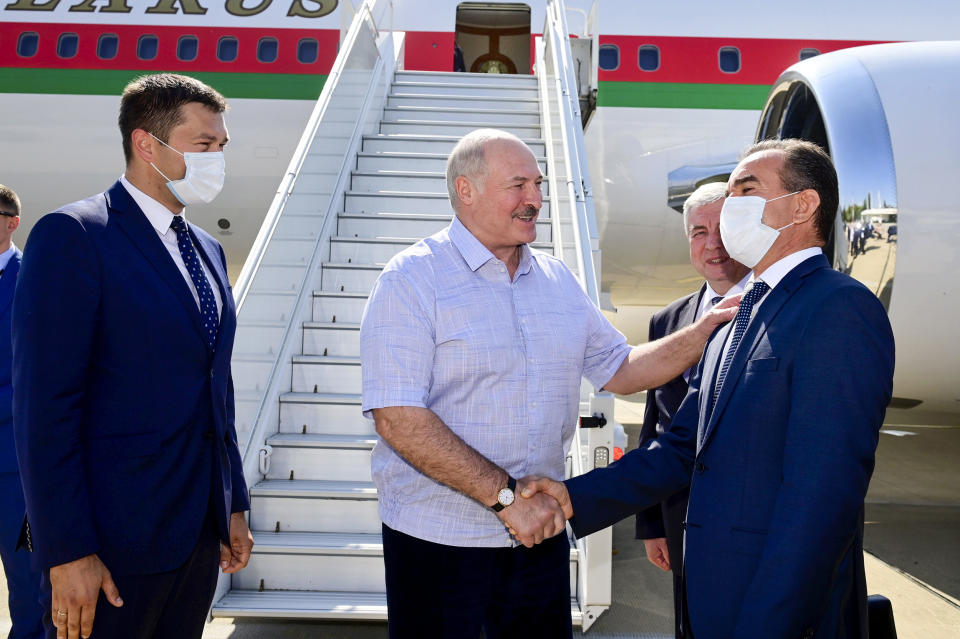Belarus' embattled president meets Russia's Putin amid ongoing protests
The embattled president of Belarus, Alexander Lukashenko, has met his last ally standing Monday, Russian President Vladimir Putin, less than 24 hours after more than 100,000 people took to the streets in the latest round of protests to demand his resignation.
The pair held a “working meeting” at the Russian Black Sea resort of Sochi — their first face-to-face meeting since a protest movement emerged across Belarus after the contested Aug. 9 presidential election. Protesters accuse Lukashenko of rigging the election in his favor.
Often referred to as “Europe’s last dictator,” Lukashenko has maintained his grasp on power in the former Soviet nation for the last 26 years and met the protests with a violent crackdown. Hundreds have been arrested and there have been allegations of torture from people held in custody.
The Kremlin said in a statement ahead of the meeting that the leaders will discuss “key issues” for the development of bilateral relations, including trade, economy, energy and culture. It made no mention of the political turmoil in Belarus.
But during a televised portion of the meeting Monday, Lukashenko thanked Putin for his "moral support in this difficult period,” alluding to protests that he has struggled to contain.
“A friend in need is a friend indeed. I say that sincerely,” Lukashenko said, leaning toward Putin, with the Russian leader exuding no obvious warmth toward his Belarusian counterpart.
Putin reaffirmed previous commitments under mutual treaties with Belarus, including a 1994 security agreement, which mandates that both countries offer assistance — including military help if necessary — if one faces an external threat.
“We see Belarus as our closest ally,” he said, while promising a $1.5 billion loan to its neighbor as the country struggles with a tanking economy amid the coronavirus pandemic.
The meeting is taking place against the backdrop of planned joint military drills involving Belarusian and Russian troops in the city of Brest, on the border with Poland, the Russian state news agency Tass reported Sunday.
Putin, one of only a few foreign leaders to congratulate Lukashenko on his election victory, has offered military assistance should the situation worsen. So far, no Russian troops have crossed the border.
Putin's relationship with Lukashenko became frosty after the failure of talks last year to deepen the integration between the two countries, with Lukashenko rejecting what he saw as an assault on his country's sovereignty.
Those ties were further strained just before the election after Belarus detained a group of suspected Russian mercenaries, whom Belarusian authorities accused of being in the country to destabilize it. Russia denied employing mercenaries for that purpose. Lukashenko has since said the arrests were a mistake.
In an all-encompassing interview with Russian journalists from state news agencies last week, he called Putin his “older brother,” emphasizing the strength of their relationship and blaming Americans, Czech, Lithuanians and Ukrainians for orchestrating the protests.
Download the NBC News app for breaking news and alerts
Putin has refrained from directly commenting on Lukashenko's crackdown on the protests and their leaders.
Last week, one of the most high-profile protest figures, Maria Kolesnikova, said she was forcefully taken to the border with Ukraine last week as Belarusian security officers tried to force her out of the country. Kolesnikova said she received death threats as she tore her passport to avoid being expelled from the country.
Nearly all senior figures in the coordination council, created in the aftermath of the protests by the opposition to negotiate a peaceful transition of power, have either been detained or forced to leave the country.

Keir Giles, of the London-based foreign policy think tank Chatham House, said the stakes were high for both sides in the talks — both men must decide how much each needs the other.
"If Russia turns against [Lukashenko], his days are numbered; but if he places himself too much in Putin's hands, his independence and that of his country risk being terminally compromised," Giles said.
"Whatever the official announcements from this meeting ... we can be sure that much more has been agreed behind the scenes, the real meaning [of which] will be played out in Belarus over the coming weeks and months" he added.
Meanwhile, the United States signaled Friday, that it will soon punish individual Belarusians with sanctions for election fraud and crackdown on protests as Washington urged Russia to tell Lukashenko to step down.
Speaking to reporters during a conference call, Deputy Secretary of State Stephen Biegun said Lukashenko is increasingly reliant on Moscow to maintain his rule. This could turn Belarusian public opinion against Russia, he added.
“It risks turning the Belarusian people, who have no grievance with Russia, against Moscow,” he said, adding that he hoped the Kremlin would voice concern about the violence against protesters in Belarus and the abductions of opposition figures.
Reuters contributed to this report.

